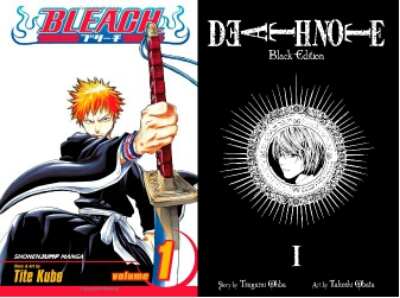Home » Posts tagged 'takeshi obata'
Tag Archives: takeshi obata
Bleach Vol 1 & Deathnote Black Edition Vol I
~~~~~
I’ve not read manga for some years, at least half a decade in fact; and then, it was Full Metal Alchemist, which I binged on for a short period, and the first few volumes of Battle Royale until the exploitation of young girls for sexual titilation frustrated me too much. Manga is as wide and varied a field as comics, though, and on the persuasion of my girlfriend, I decided to give it another shot, with Deathnote (on her explicit recommendation) and Bleach (on the basis of being one of the longest running series there is). Half of that proved to be a good decision…
To start with the art styles of each, they’re both superficially similar, the black-and-white relatively clean-line images in the same kind of style; it’s a hallmark of most of the manga I’ve read in fact. However, Bleach is distinctly messier, artistically, than Deathnote; between motionlines that obscure rather than clarify the events of the comic, excessive use of shading and chaotic use of space contrast poorly with Deathnote, which is illustrated with a surer hand that combines well with the story, in terms of facial expression, variety of description and more; it’s a fantastic piece of artwork and writing both.
The plots of each are reasonably equivalent in their execution; Deathnote is a combination of a story of a vigilante turning into a villain, a brilliant character study of the degeneration of Light Yagami from high-minded crusader to megalomaniac self-preservationist locked into battle with the equally, albeit differently, competitive and megalomaniac elusive detective L. In fact it’s partially that competition, that need to escape, that drives the degeneration of Light; and it’s a beautifully executed piece of characterwork, especially as Ryuk – the Shinigami whom only Light can see – impartially observes and comments on the events of the plot, and by doing so changes it. The way the different parts of the plot and groups of cast integrate is fantastic, and the consistent tone – serious, philosophical, but not without a significant degree of leavening humour – is brilliant. This is in stark contrast to Bleach, which can’t decide what it wants to be; a bizarre comedy, a sitcom with a difference, a relationship drama, a high school drama, or a sort of urban fantasy ghost story. The plot can’t quite decide what it’s focused on; the integration into humanity of Rukia, the way Ichigo is coming into his powers, the high school drama or the bizarre, exaggerated, impossible home life of Ichigo. These elements don’t really hang together or add to each other, making the story chaotic and confused.
Characters follow a similar line; Bleach doesn’t have characters so much as caricatures, from the rage-driven and impulsive (redhead, of course) Ichigo to the out-of-touch-with-humanity of Rukia; from Ichigo’s ultraviolent, insane father to the lovestruck Orihime. Every single one of these characters is one-dimensional and simplistic; they’re not interesting, they’re not enjoyable to read, they’re not really people we care about or connect with. Ploughing through that lack of distinctiveness for the ‘wacky hijinks’ of the plot feels like a complete waste of time and effort, because those are themselves unfunny and exaggerated. How much of this is due to a loss in translation is of course an open question, as is the effect of cultural shift, but that Deathnote manages to have an absolutely brilliant plot might undermine that somewhat. The dual plots of Light coming into his own as the user of the deathnote to clear up the world and his contest with ‘L’ to avoid capture by this criminological genius. These two strands converge and mix fantastically, and are built on by a wry sense of humour, a use of nonstandard chronology (going back to reveal both Light’s and ‘L”s plans after they have come to fruition), and philosophical considerations especially around the corrupting effect of power. This writing is beautifully done and smooth to boot; Deathnote really flows as a story.
In the end, Deathnote is a fantastic manga and a fantastic advertisement for the possibilities of what manga can do; however, Bleach – seemingly both longer-running and more popular – is simply a mess, undeserving of the attention it has received.

